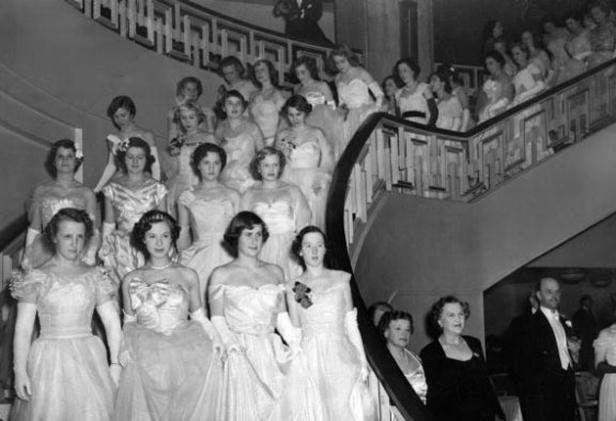
Marking 60 years since the last debutantes were presented at court to the Queen, one of the very last debs, Elfrida Eden Fallowfield, fondly recalls the end of the London Season. Interview by Olenka Hamilton
Elfrida Eden Fallowfield, now 77, vividly recalls a cocktail party she attended in London as a debutante in 1958. ‘I remember thinking beforehand, if no one asks me to dinner I’ve failed,’ she says. The worst happened. ‘I was so embarrassed, I went into the hostess’s bedroom and called a taxi and then hid in the bathroom. I then crept down the stairs and ran out of the door.’
All the girls were desperate to be asked out for dinner, of course. ‘We had such a glamorous time in those days. We might have started with dinner at Quaglinos, followed by a nightclub: maybe the 400 or Café de Paris, if we were really lucky.’
Although Fallowfield was allowed out, her mother, Patricia, Lady Eden, who started the famous Lady Eden’s school in a house on Victoria Road in Kensington, ran a tight ship. ‘I had one of those mothers who would stay up waiting for me to get home, peeking through the curtains in case we might be caught kissing in the car outside,’ Elfrida remembers fondly.
‘We were allowed a certain amount of freedom, but we didn’t have the pill and most of us didn’t realise what “going too far” meant. It just wasn’t talked about. We did suspect that a couple of girls did it. We so wanted to be grown up, but we were all so under thumbs of our mothers and we dressed like them.’
The daughter of a baronet, the niece of former Prime Minister Sir Anthony Eden and the youngest of four sisters, all of whom had been debs, it was always a given that an 18-year-old Elfrida would get the call. What wasn’t a given was that she would be taking part in the last ever London Season – ‘They picked a year and decided that was that, and they made the most unbelievable fuss of us,’ she remembers.
What followed was a succession of balls and cocktail parties and the beginning of an exciting period in Elfrida’s life which saw her propelled into the limelight as one the ‘It girls’ of the time. A ballerina, she had spent time studying abroad in Paris and Germany, which made her slightly different from most of the rest of the aristocratic girls who would have been sent to finishing school. ‘I was very naughty and I was a bit tongue in cheek about the whole thing,’ she says, and she wasn’t especially concerned with finding a husband. ‘I fell in and out of love with increasing rapidity as the season wore on,’ she adds. ‘I always said to myself, I’m never going to marry a typical Englishman. I thought what I want is someone foreign, that would be romantic. Or someone American.’

Among her contemporaries, one married the Aga Khan and another married Earl Beatty. Another one was Fiona McCarthy, who wrote The Last Curtsey. ‘We thought she was a real blue stocking because she went to university and worked at the Guardian.’ And then there was Rose Dugdale, who ‘rebelled and became an anarchist’. Elfrida did eventually marry an Englishman, Richard Fallowfield, whom she met in New York several years later.
‘If I’d met him when he’d been in England, though, I wouldn’t have liked him because he was very much the bowler hat, folded umbrella and briefcase type. Luckily he’d been in America a couple of years and that had been knocked off him. We actually had the most enormous fun in our first married year living in New York. Everyone adored us because we were English, and he was devastatingly good looking. He was very dishy.’
Elfrida was photographed and interviewed by the Tatler among others, and appeared on the front cover of Sketch, an illustrated weekly journal of the era — much to her father’s disapproval. ‘Yes, I enjoyed the publicity,’ she says. ‘I remember I was rung up by Tatler and asked who I would propose to on 28th February and why. ‘I went for the richest: Evelyn de Rothschild. I was very naughty really,’ she says, reading me the cutting, which implies as much: ‘I’m going to propose to Evelyn de Rothschild because he’s very well endowed. But those things don’t really matter but he’s loaded isn’t he?’
Once the chosen debs had been called up, the mothers set to work, getting together for lunches and swapping notes. ‘The aim was to suss out who was going to be giving the best and biggest ball, and then to quickly offer to give a dinner party,’ Elfrida remembers. ‘Mummy hosted two tea parties for me at the Savoy.’
Every party provided another sartorial opportunity. ‘We were not in the same league as some of the girls,’ recalls Elfrida. ‘My mother was jolly clever and whipped off to New York and bought me masses of clothes.’ She shows a picture of herself aged 18 wearing a beautiful satin dress which came from Bergdorf Goodman, the New York department store. The yellow dress has been on display at a special commemorative exhibition, The Last Curtsey: Etiquette and elocution, the life of a Debutante, at Hall Place in Bexley. ‘I loved it. I loved them all,’ Elfrida says, still tall, slim and smiley, as she appears in the picture taken 60 years ago. ‘But my mother had this terrible habit; she got rid of most of them when I was abroad.’
On 20 March 1958, the last debutantes were presented at Court to The Queen. ‘Although I wasn’t the last presented, I hung around the steps at the end just to make sure I was the last to leave,’ she recalls. The Queen had ‘decided enough was enough and decreed that Court Presentations would cease,’ Elfrida explains in her wonderful autobiography, The Dancing Debutante.
The Season had had a very specific function in the past, which was to introduce girls of the right age and background, who up until that point would have spent their lives in the country being educated in music, reading and riding, to society in the hope that they would find a husband. As a result, it ran from April to July, when both the hunting and shooting seasons were over which meant the main social activities would take place around the capital. ‘There would be a rich duke – perfectly hideous – with an estate, and along would come a very pretty girl with quite a lot of money. After the heir and spare was produced, it was accepted that people would go off and have their liaisons. People didn’t often marry for love but to improve their status,’ Elfrida explains.
By 1958 however, the British society had changed beyond recognition. Girls were better educated and better travelled and often went abroad to learn languages and generally broaden their horizons. The wars had also turned society upside down, with many future debs finding themselves working in munitions factories, driving ambulances or becoming auxiliary nurses during the First World War. All this changed their perception of the season.
Does she lament the changes to British society over the past century? ‘I think it’s good that society is muddled up,’ states Elfrida. ‘Nothing but good. I don’t believe in elitism. But I think in a lot of ways it’s just gone too far the other way.’
As a deb she received, she says, ‘a ridiculous amount of publicity. Because of my well-known family name I was constantly photographed and quoted, often in the most banal way.’ She has kept scrap books stuffed to the brim full of the hundreds of various newspaper cuttings from the time, which she leafs through with the distance and amusement of someone who still finds it baffling today.
‘I hate this celebrity over-the top famous for being famous. I love people being famous for doing something worthwhile. Not just famous for nothing,’ she says. For of course Elfrida’s life as a debutante was just an episode in a very full life lived around the world, from Europe to Hong Kong to Australia where she ran some of the world’s best ballet schools, the Vacani schools.
It was right that the season ended when it did because there simply wasn’t a place for it in modern society anymore, she stresses. ‘Although I would have been chagrined if they’d ended in 1957,’ she adds, with the same charming yet mischievous smile which appears in all the cuttings.
Olenka Hamilton is staff writer at Spear’s
Related
Spear’s interview: Clarissa Eden on Churchill, the folly of Suez and Brexit









